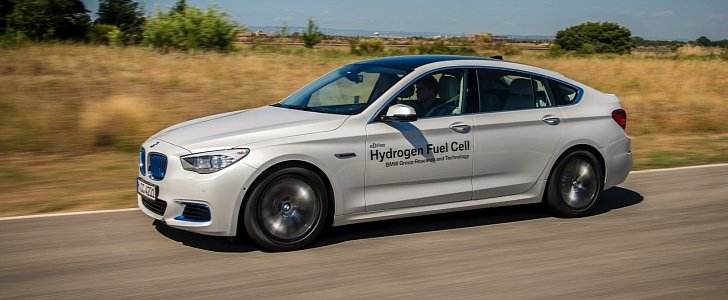The Tokyo Motor Show 2015 that kicked off last week was expected to bring out some interesting inside info about what most manufacturers have in plan for the near and far future, and it certainly delivered. BMW, for example, has just confirmed that it is working on a fuel-cell powered vehicle that will be coming out after 2020.
The news comes from the man in charge of fuel-cell development at BMW himself, Mr. Merten Jung. During an interview, he confirmed not only the car but also the body type and a timeframe for its release, the one aspect that has been sketched based only on rumors up until now.
"It will be sometime after 2020. We don't have a model yet, but ... as the character of our technology favors larger cars, our model will probably be something like a long distance car, a larger sedan."
That leaves us with a car that should be similar in size to the standard 7 Series, the long wheelbase model being the largest sedan the Germans are building at the moment. That would also mean that the first fuel-cell vehicle from Munich could be a longer 5 Series, a 7 Series, or an entirely new concept. Judging by how all sorts of niche versions of traditional best-sellers started making headwind lately, this approach wouldn’t surprise us in the slightest.
As a matter of fact, the first fuel-cell concept revealed by BMW was in the shape of the 5 Series GT, a car that shares its chassis and wheelbase size with the F01 7 Series. Coincidence? We think not.
As far as the powertrain goes, the answers will come from BMW’s partnership with Toyota. The Germans signed a deal with the Japanese manufacturer back in 2013 to fund research in the field together. Since the parts needed for fuel-cell cars are expensive to build, let alone come up with, more and more manufacturers are following this path, trying to split the bill.
The first car launched after the deal was struck is the Toyota Mirai, that was unveiled in late 2014 with a range of 700 kilometers (435 miles), which is impressive but not enough according to BMW.
Using the same powertrain is impossible especially since the German alternative would be larger in size and expected to deliver greater range. Furthermore, Mr. Jung himself has confirmed that the two companies won’t sell the same car under a different badge, as the customers they’d have to appeal to would be considerably different as well.
While BMW is the best-selling premium brand in the world, Toyota holds the title of the biggest car maker, currently overtaking Volkswagen for the most cars sold on a global scale. Therefore, the target demographics would be different, leading to different vehicles altogether.
"It will be sometime after 2020. We don't have a model yet, but ... as the character of our technology favors larger cars, our model will probably be something like a long distance car, a larger sedan."
That leaves us with a car that should be similar in size to the standard 7 Series, the long wheelbase model being the largest sedan the Germans are building at the moment. That would also mean that the first fuel-cell vehicle from Munich could be a longer 5 Series, a 7 Series, or an entirely new concept. Judging by how all sorts of niche versions of traditional best-sellers started making headwind lately, this approach wouldn’t surprise us in the slightest.
As a matter of fact, the first fuel-cell concept revealed by BMW was in the shape of the 5 Series GT, a car that shares its chassis and wheelbase size with the F01 7 Series. Coincidence? We think not.
As far as the powertrain goes, the answers will come from BMW’s partnership with Toyota. The Germans signed a deal with the Japanese manufacturer back in 2013 to fund research in the field together. Since the parts needed for fuel-cell cars are expensive to build, let alone come up with, more and more manufacturers are following this path, trying to split the bill.
The first car launched after the deal was struck is the Toyota Mirai, that was unveiled in late 2014 with a range of 700 kilometers (435 miles), which is impressive but not enough according to BMW.
Using the same powertrain is impossible especially since the German alternative would be larger in size and expected to deliver greater range. Furthermore, Mr. Jung himself has confirmed that the two companies won’t sell the same car under a different badge, as the customers they’d have to appeal to would be considerably different as well.
While BMW is the best-selling premium brand in the world, Toyota holds the title of the biggest car maker, currently overtaking Volkswagen for the most cars sold on a global scale. Therefore, the target demographics would be different, leading to different vehicles altogether.
